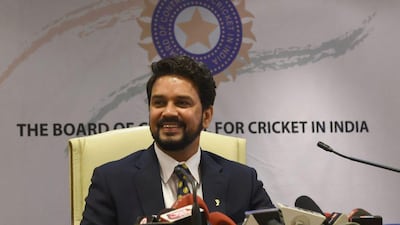Date: September 23, 2005
Venue: Main lobby, Taj Bengal hotel, Kolkata
Event: AGM and elections of Board of Control for Cricket in India (BCCI)
It was break time and Anurag Thakur came out of the main meeting room, looking tired and confused, and plonked himself on a single-seater chair which was almost isolated in a seven-seater sofa set in the busy lobby.
Former union minister for civil aviation Praful Patel came over to him, spoke for a brief two minutes and then headed to the toilet where every one else was headed.
That toilet was where the media was getting information leaked about the latest developments on the choice of the next president of the Board of Control for Cricket in India (BCCI) in a much-publicised contest among two factions.
No one had much time for Thakur.
Also from the author: The RCB momentum will test Gujarat's consistency in the IPL play-offs
Meanwhile, he weighed his options as representatives from both factions briskly assured him that his interests would be taken care of, in lieu for his vote.
But it had been three years since the pride of his Dharamsala constituency in Himachal Pradesh (HP), the HPCA Cricket Stadium, had been built and all he was desperate for was to see some quality action at the scenic venue.
All Thakur wanted was to take something away from the meeting like a seasoned shopper trying for a hard bargain. He knew his task was hard because he was still a rookie at 31 when heavyweight politicians and hardened cricket administrators were finding it difficult to sway the elections their way.
He was not even a member of parliament then. He became one in 2008, following in his father’s footsteps, for the ruling Bharatiya Janata Party (BJP).
The 2005 election was eventually won by veteran politician Sharad Pawar, who himself had made it a grudge affair having lost to Jagmohan Dalmiya in 2004. Both served as the head of the International Cricket Council (ICC).
Cut to 2016. In just 11 years, from a mere voter to the new BCCI president at a young age of 41, Thakur has earned his stripes the hard way. Fate dealt him a good hand but his ambitious attitude was always predominant.
Thakur has succeeded Shashank Manohar to become the fourth BCCI president in less than two years.
Even as recently as 2011, Thakur was still on the periphery but a vital cog in the wheel when N Srinavasan took him into his faction.
Top businessman Srinivasan had to abdicate in the crisis after the 2013 corruption scandal in the cash-rich Indian Premier League which forced the supreme court to step in.
Srinivasan placed a sick Dalmiya in his place but his predecessor died about nine months after taking over. Manohar was a clean and common candidate, but his tenure lasted a little over six months, before he gave up to take over as ICC chairman.
It is important to note here that when Manohar took over in his second stint as a consensus man, Thakur became the joint secretary (the second most important position in BCCI) from the Pawar camp, and not on a BJP ticket like most of Srinivasan’s aides.
Unlike the past elections, there were no names in the fray the moment Thakur announced his candidature. As per procedure, the name has to be proposed by a zone – the BCCI votes are divided across five zones – to be considered a legal entry.
Thakur’s name was proposed by the East Zone, comprising the majority of states not belonging to the ruling BJP. He ended winning unopposed.
Clout counts.
Follow us on Twitter @NatSportUAE
Like us on Facebook at facebook.com/TheNationalSport


